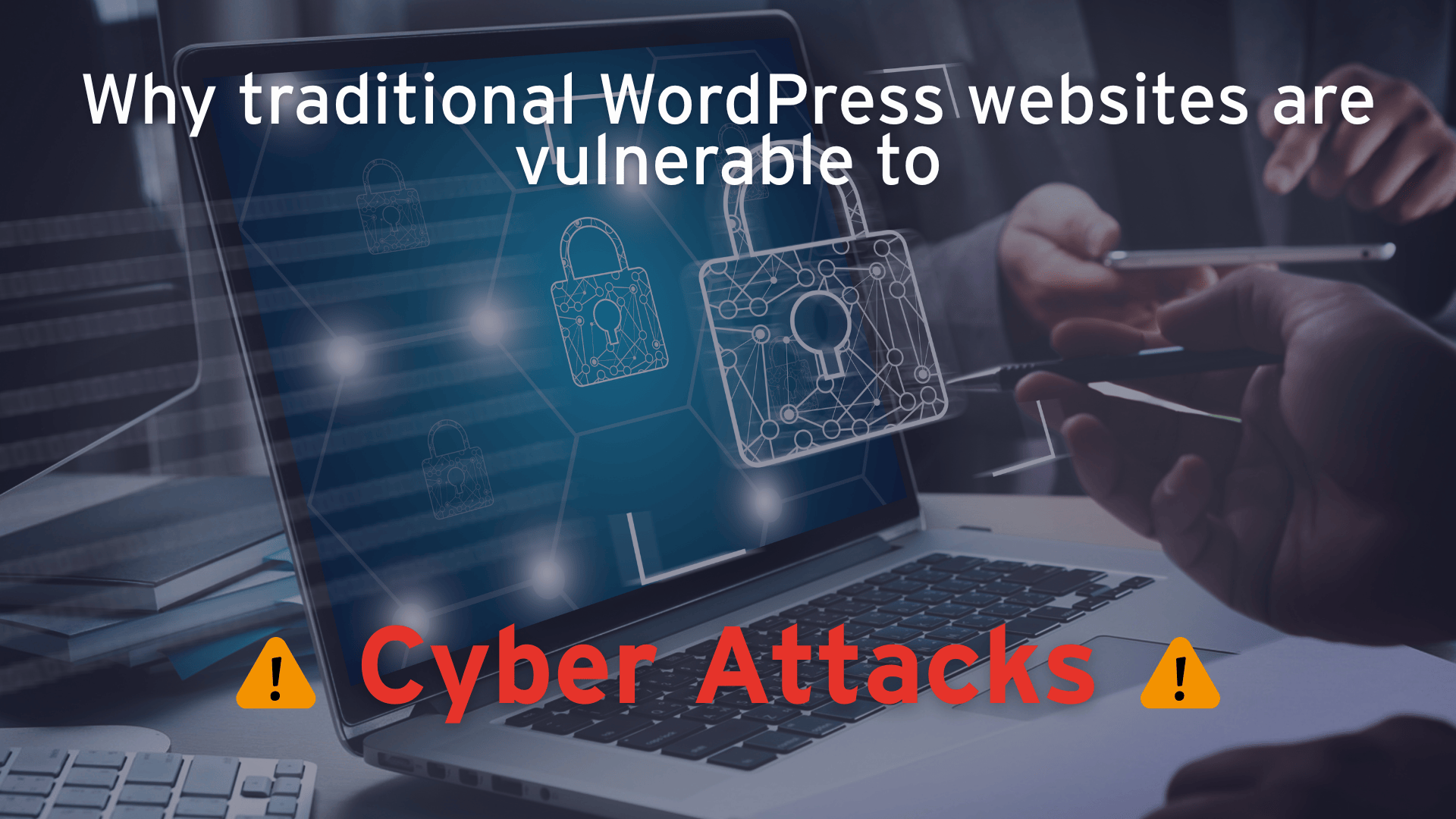Tips and advice

Why traditional WordPress websites are vulnerable to cyber attacks
By Lauren Williams
31 Jul 2025 • 4 min read
Share this post

WordPress is the world’s most popular website platform, powering over 40% of all websites . But popularity comes with a downside, it’s also the biggest target for hackers.
As a small business owner, the last thing you want is a hacked website stopping you from booking discovery calls with your best clients. A single breach can damage trust, cost you leads, and make growth feel impossible.
Let’s look at why traditional WordPress websites are more vulnerable, and what you can do to protect your business.
TL;DR (Too long, didn’t read)
- Traditional WordPress sites are popular, which makes them big targets for hackers.
- Plugins and themes can contain vulnerabilities that expose your site.
- Default login pages and out-of-date software make attacks easier.
- Headless websites separate your front end from your backend, reducing the risk.
The problem with traditional WordPress sites
Traditional WordPress sites rely on a combination of:
- A public-facing backend (wp-admin)
- Themes and plugins (often from different developers)
- A database that sits behind it all
This setup makes it convenient to build and customise a site. But it also creates multiple ways for attackers to get in.
1. Plugins can open the door to hackers
Plugins are one of the biggest selling points of WordPress, there’s a plugin for almost everything. But every plugin you install is another potential entry point.
Many attacks happen simply because:
- Plugins aren’t updated regularly
- Developers stop maintaining them
- A vulnerability goes public before you have a chance to patch it
It only takes one outdated plugin to bring your business to a halt. Instead of focusing on growth and booking calls, you’re stuck firefighting tech issues and trying to rebuild client confidence.
Check here to see if your plug-ins have any vulnerabilities – https://www.wordfence.com/threat-intel/vulnerabilities/wordpress-plugins/
2. Login pages are easy targets
Most WordPress sites keep the login page at the default /wp-admin or /wp-login.php. Hackers know this and use automated tools to bombard the page with login attempts until they get in.
If you haven’t changed your login URL, enforced strong passwords or added extra protection, you’re leaving the door wide open.
When hackers get into your site, it’s not just about data, it’s also about lost opportunities. Imagine a potential high-paying client trying to book a discovery call only to find your website offline. That’s a conversation you’ll never get back.
Learn why you should change your WordPress URL here: https://managewp.com/blog/change-your-wordpress-login-url
Want to change your WordPress URL, learn how to here: https://www.elegantthemes.com/blog/tips-tricks/how-to-create-a-custom-wordpress-login-url
3. Themes can contain hidden risks
Just like plugins, themes are made by third parties. Poorly coded or outdated themes can have security flaws that hackers exploit. As well as creating security risks, they make your website look and feel unreliable. And if your website doesn’t inspire confidence, why would a premium client trust you with their business?
Free themes from unverified sources often include malicious code hidden in the files.
Scan your website with WordFence scanner: https://www.wordfence.com/threat-intel/vulnerabilities/wordpress-themes/
4. Everything is in one place
With traditional WordPress, your website’s content, functionality and backend are all tied together. If attackers get access to any part of your site, they often gain access to everything else.
Traditional WordPress websites can work brilliantly, but their structure and reliance on plugins make them more vulnerable to cyber attacks.
If you want a safer, more reliable alternative, consider going headless. By decoupling your website, you dramatically reduce the number of ways hackers can break in and you’ll spend far less time worrying about security updates and plugin vulnerabilities.
With The Mativus Platform, your website becomes part of a growth system that’s safe, reliable, and designed to book discovery calls with your highest-paying clients. You get a secure site, automated follow-up, and lead magnets that attract the right people, without the stress of patching plugins or chasing hacks. Ready to protect your business and grow with confidence? Let’s book that initial discovery call.

Lauren Williams
Receive a free
website audit
website audit
Want to know how a headless site could help your business? Submit your website and e-mail address and we will send you a free report on how your website can be supercharged by going headless.